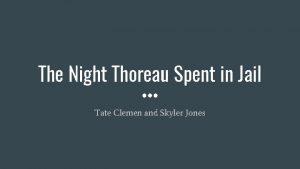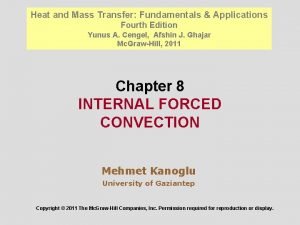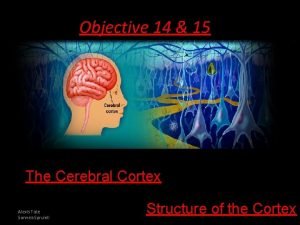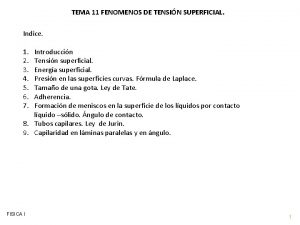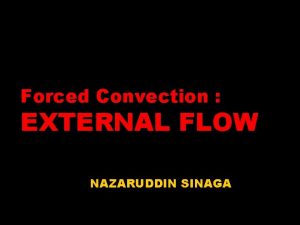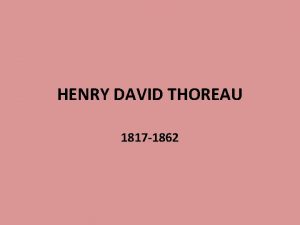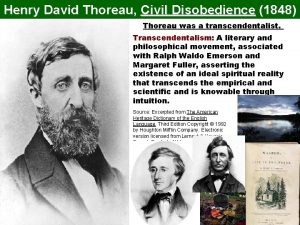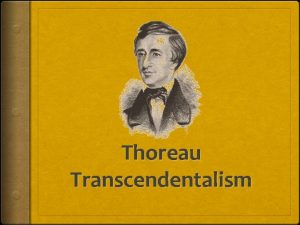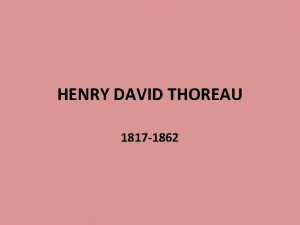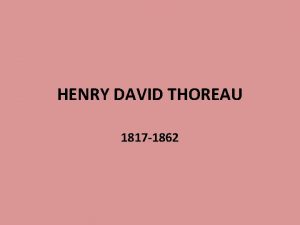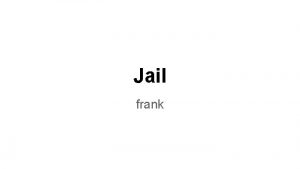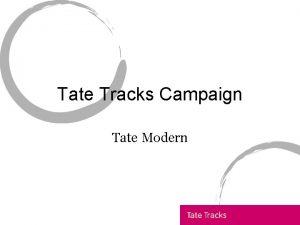The Night Thoreau Spent in Jail Tate Clemen















- Slides: 15

The Night Thoreau Spent in Jail Tate Clemen and Skyler Jones


The Basics Title- The Night Thoreau Spent in Jail Author- Robert Edwin Lee and Jerome Lawrence Date of Publication- 1970 Genre- Dramatic Play

Plot Summary Henry David Thoreau is thrown in jail due to his refusal to pay his taxes that would go to fund the Mexican-American War, which he did not support. Waldo remembers back to Henry, and the scene cuts to Henry meeting Bailey, a man falsely accused of arson whom shares a cell with Thoreau. Henry becomes a school teacher in the town, but leaves after Deacon Ball requires him to whip the children. Henry starts a school with his brother, John, but many parents pull their students out of the school. But Ellen stays to learn more about Transcendentalism.

Plot Summary (cont. ) Henry takes Ellen on a boat ride, educates her on Transcendentalism, and falls in love with her. When he realizes she is not that interested in him though, he sets her up with his brother, John, who later proposes to Ellen refuses because her father refuses to let her marry either of the Thoreau boys. John ends up dying from blood poisoning. Henry’s aunt pays the debt Henry owes and he is released.

Impact The authors most likely wanted to highlight Henry David Thoreau’s boldness. Not paying a poll tax wasn’t unprecedented, but doing so as a form of protest was unprecedented in Western society. Thoreau stood up for his beliefs, no matter the cost, and obviously, even when inconvenient, because he was thrown in jail for not paying that tax to support the Mexican-American War. Though Thoreau was mostly chastised for his actions at the present time, the world certainly thanks him for his inspiring pleas to stand up for what you believe, and not to let your beliefs be adulterated by a broken world around you, but; instead, to say and act by the dictates of your conscience. Moreover, to not just be good and know what is right, but to “be good for something. ”

Famous Quotes - “I refuse to commit murder, that is why I am here” - This quote is from Henry to Bailey - This is significant because Henry believes that paying for the war is supporting murder, and Henry’s refusal to pay taxes is the general basis of the book. - "What you believe is irrelevant. Your opinion, as a teacher, has not been asked for. I direct you to FLOG!" - This quote is significant because this is the point where Henry refuses to teach in the manor of the society and he ends up opening his own school. - "Henry, if love is all around you, like huckleberries, why do you pick loneliness? "

The book’s setting/ The setting at the time of publication - Concord, Massachusetts - During the time of the book’s setting, America is experiencing a renaissance of the arts and literature, sparked by Ralph Waldo Emerson, a Henry David Thoreau disciple. At the heart of the renaissance was Transcendentalism, a self-sufficient, spiritual idealism that advocated for personal freedom, nonconformity, and the ability to transcend the physical reality, and thus find the meaning in life. - Authors utilized Thoreau’s protest against the Mexican-American war as a subtle protest against the Vietnam War, which was going on at the time TNTSIJ was written.

About the Authors - Robert E. Lee and Jerome Lawrence - Robert E. Lee (1918 -1994) was an American playwright and lyricist that graduated from Ohio Wesleyan University. He met Jerome Lawrence working at an advertising firm in January, 1942. The two are best known for their partnership with each other. - Jerome Lawrence (1915 -2004) was an American playwright and author that graduated from Ohio State in 1937 and UCLA in 1939. He partnered with Robert E. Lee in 1939 to create Armed Forces Radio, which was just shut down in March 2017 due to budget cuts. Lawrence continued to work with Lee until his death in 1994. Most of Lawrence and Lee’s works draw on controversial events in United States history to discuss contemporary issues. Inherit the Wind, for example, addressed intellectual freedom vs. Mc. Carthyism in a fictionalized version of the Scopes Monkey Trial.

Characteristics of the Genre - Dramatic plays promoting social justice - This genre has a wide range in terms of the issues being discussed, but overall, this genre consists of plays trying to achieve societal change. The Night Thoreau Spent in Jail attempts to protest against the Vietnam War while also looking to inspire people to rely on their own intuition and what they honestly, from the goodness of their heart, believe is right, rather than blindly following what others around them are doing. - Other examples: To Kill a Mockingbird- Atticus Finch bravely stands up for a black man charged with murder amongst a racist community that threatens him and his family for defending an innocent man. 12 Angry Men- 12 members of a jury discuss the guilt or innocence of a man on trial for murdering his father. The play considers the role of reasonable doubt in determining whether one is guilty or innocent, while also highlighting how personal biases and bigotry play into the justice system.

Characters Henry David Thoreau- Ralph Waldo Emerson - Main Character/ Protagonist - Henry’s mentor - Henry is in jail because he refuses to pay taxes because he doesn't believe in the war - Helped start the transcendentalist movement - The play revolves around him telling his story from prison - Harvard educated teacher - Young, defiant, progressive thinking - Leader, powerful and famous speaker

Characters (cont. ) John Thoreau Bailey - Henry’s brother - Henry's cellmate - One of the only people Henry seems to actually love - Uneducated - Dies from an infection from a rusty razor cut - Passionate and thoughtful - Whom Henry tells the story to - Henry teaches him to read and write

Significance of the Opening Scene The significance of the opening scene stems from the amount of exposition to set the scene. Henry is in jail telling the story to Bailey. These stories lead into the flashbacks which is what the whole play is based out of. This gives the explanation of why he's in jail, which is the reason for the whole show.

Motifs and Symbols Huckleberry Hunting - This is a symbol for Henry's search for knowledge and education - It also represents his approach to teaching The Jail Walls - The walls in the play are imaginary - The represent power in society and the constraints that society puts on people

Importance of the Final Scene The dream sequence at the end of the play is important because the reader/watcher sees how Henry deals with the loss of his brother, the one person that he truly loved. John was such a powerful force in Henry's life, that it has a big impact on him.
 Robert e. lee (playwright)
Robert e. lee (playwright) I ___ my homework last night.
I ___ my homework last night. Peggy tate
Peggy tate Heat transfer
Heat transfer Tate gallery
Tate gallery Tate wudsn
Tate wudsn Had tom ever come inside the ewell’s fence before?
Had tom ever come inside the ewell’s fence before? Numero de nusselt
Numero de nusselt Dittus-boelter equation
Dittus-boelter equation Alexis tate
Alexis tate Heck tate is wise and tolerant
Heck tate is wise and tolerant Kiite kudasa
Kiite kudasa Ley de jurin
Ley de jurin Richard etheridge and tucker
Richard etheridge and tucker Nusselt number laminar flow in tube
Nusselt number laminar flow in tube Https://www.tate.org.uk/kids/games-quizzes/street-art
Https://www.tate.org.uk/kids/games-quizzes/street-art
